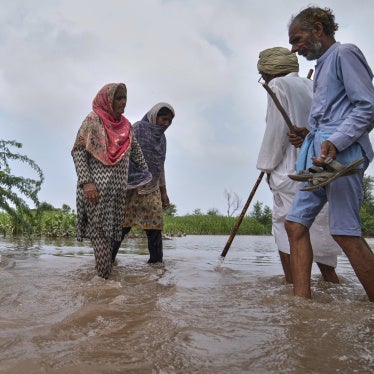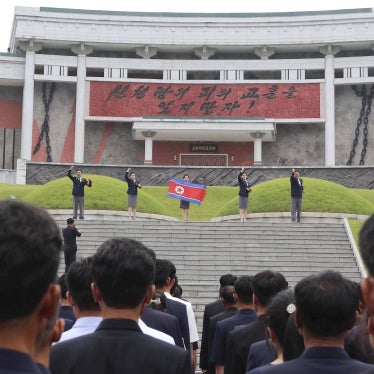More deaths in East Timor are inevitable unless immediate, collective pressure is brought to bear on the Indonesian government to stop its regular security forces from aiding proxy militias, Human Rights Watch said today, in the aftermath of four and possibly five deaths in Dili on Thursday.
That pressure should involve direct calls from the leaders of Indonesia's key donors, including German Chancellor Schroeder, Japanese Prime Minister Obuchi, Australian Prime Minister Howard, and U.S. President Bill Clinton, to Indonesian President Habibie. The leaders should warn the Indonesian president in no uncertain terms that aid programs and loans—except for humanitarian assistance and support to civil society—will be suspended immediately and be resumed only when serious steps are taken to improve the security situation in East Timor. Those steps should include holding Indonesian security forces and militia leaders accountable for their complicity in the violence.
If that message is not delivered, Human Rights Watch said, not only East Timorese civilians but U.N. personnel and foreign journalists could be the next casualties.
On Thursday, four deaths were confirmed and at least one other appeared likely in the aftermath of violence linked to a pro-autonomy rally. Two pro-autonomy youths were stabbed to death in the Becora area of Dili, while at least two and perhaps three pro-independence people died from gunshot wounds. Reports, as yet unconfirmed, suggest that two of the latter were shot not by pro-autonomy militias but by an Indonesian army soldier and policeman respectively.
Virgilio da Silva and Apollinario Pinto da Silva, both from Viqueque and supporters of autonomy, were stabbed to death about 3:00 p.m. reportedly in a clash with pro-independence youths. Anastacio Moniz died from his wounds at the headquarters of the UN Mission in East Timor after being shot nearby, reportedly by a soldier. A second youth, Baldinho (also seen as Bernadino) Gutteres, was reportedly shot by a Brimob (mobile police brigade) member in the Kuluhan area of Dili after shouting insults at the police for failing to stop violence by militia members. The militia was terrorizing the capital with guns, both homemade and automatic.
The Jakarta-based newspaper Kompas also said a person named Metta Araujo was among the dead; other reports said a high school student with a similar name who may be the same person had been shot and perhaps killed in the Kuluhan clash. Several others were shot and wounded, including a Kompas journalist, when either the militias or the Indonesian security forces opened fire, and two members of the Dili-based Aitarak ("Thorn") militia were said to have been dragged from their car and remained missing as night fell in Dili.
The violence came as pro-autonomy supporters, backed by armed militias, staged a parade and rally in Dili as part of the campaign for the referendum to be held next Monday, August 30. Clashes broke out at different parts along the parade route. Near the residence of Bishop Belo in the Licidere district, youths threw stones at pro-autonomy marchers who tried to take down a flag of the pro-independence organization, Concelho Nacionale de Resistencia Timorense (CNRT). Elsewhere, the marchers vandalized the house of an ethnic Chinese, Lai Nee Cho, then burned his car and kiosk, according to Indonesian journalists. A few minutes later, a minivan with more pro-autonomy marchers arrived, and they were stoned by angry bystanders. One of the marchers was stabbed, according to this report, possibly one of the two named above who died.
The stabbing heightened tensions, and it was after this that militia forces armed with guns began firing, and attacked a hotel where foreign journalists was surrounded.
Despite repeated calls by the international community and UNAMET on the Indonesian government and military to cease support for the pro-autonomy militias and punish perpetrators of violence, no serious steps in that direction have occurred. The Aitarak militia's leader, Eurico Gutteres, has called on his supporters to block all roads out of Dili on August 31, the day after the vote, suggesting that if anything, violence is likely to increase, not end, after the referendum has taken place.
Several nongovernmental groups in and out of East Timor, as well as parliamentarians from Australia, Europe, and the United States, have called for U.N. peacekeepers to be sent to East Timor immediately. Under the terms of the May 5 agreement on the referendum, however, peacekeepers can only be deployed after Indonesia's highest legislative body has formally ratified the results of the referendum, and that is not likely to happen until November at the earliest and possibly even later. In the meantime, the U.N.Security Council is expected to approve on Friday an increase in the number of unarmed military liaison officers and civilian police, bringing the totals to 300 and 460 respectively.








